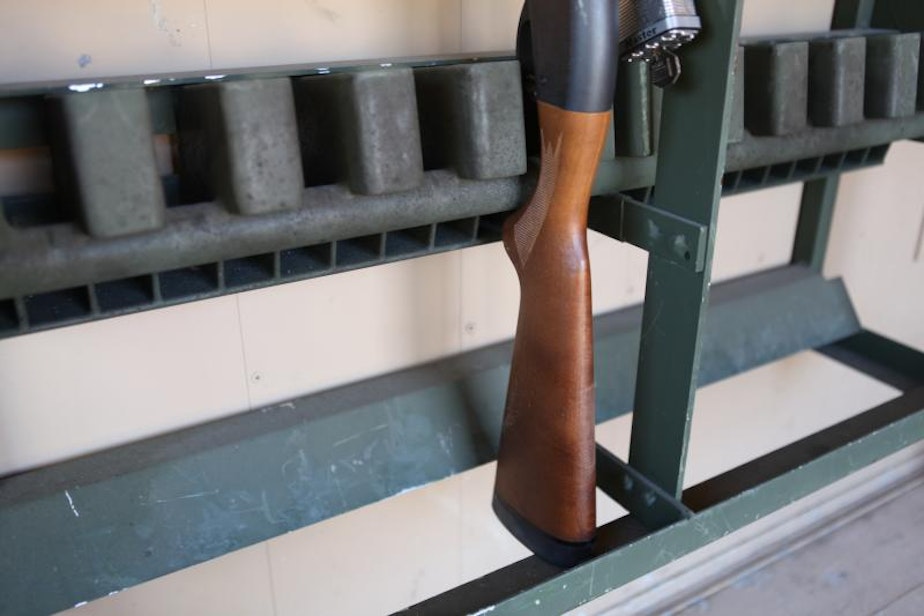Get up to speed on gun safety measure I-1639

Initiative 1639, a measure that would make changes to how Washingtonians buy and own firearms, is the only statewide gun control measure on a ballot anywhere in the upcoming midterms.
Angela King takes a look at Initiative 1639 with political analysts Joni Balter and C.R. Douglas.
King: Joni, I'll start with you. How do you size up this campaign?
Balter: I think it's fascinating. Right now we have a gun measure on the ballot that would put Washington in the top five or six states with tough gun laws. And it's not even the biggest spending measure that our voters are facing right now, not even close. We always say "Oh, the big, bad NRA, they can buy their way through any legislative session." But here it's interesting ... the NRA has only put up $200,000 so far. It's like they can read polls or something, or they're planning a big lawsuit afterward.
Let's just take a look at what the initiative does: New background checks, creates a waiting period to buy semiautomatic rifles, raises the age to buy those weapons from 18 to 21 and requires owners to store all of their firearms. C.R., what do you see as the biggest change here?
Douglas: I think the meat of this initiative is raising that age limit for the purchase of the semiautomatic rifles from 18 to 21. That brings it in line with the age limits for handguns, which has been at 21. Clearly it's some high profile events that are triggering this, if you will. We had the Parkland shooting in Florida, where a 19-year-old legally purchased a semiautomatic rifle, went into a school and killed 17. We've had a local version of this, the Mukilteo shooting. A 19-year-old legally purchased a semiautomatic rifle, went up and killed three at a private party. So theoretically, you can stop those kind of events with this new measure and this raised age limit. But nearly all of the mass shootings in the U.S. have been committed by those over 21. I mean over 90 percent have been over 21. So it goes to show you it's very tough to craft gun laws that work.
You were mentioning earlier the lawsuit to try to stop this got tossed out. Do you think that lawsuit will reemerge if 1639 passes?
Balter: I think that's the full strategy here. If the measure passes, the thing that will happen next are lawsuits and they'll be on a couple different possible fronts. Second Amendment, obviously. Single-subject rule ... Washington initiatives are to be about one item. And there were some earlier legal challenges about the way that the petitions were prepared and whether or not in some cases the font was big enough to show people who were signing exactly what would happen if they signed this measure and they voted for it.
Law enforcement organizations have come out against this measure. The president of the State Patrol Troopers Association calls it unenforceable. What's that about?
Douglas: It's very tough to go into someone's house and decide whether they have safely stored their gun or not. Law enforcement is mixed on this, some are supporting it and some aren't. But that safe storage piece seems to get them riled up. Many in law enforcement feel like they should be exempt from it. After all, they're firearms experts and shouldn't necessarily be told what to do. But they also echo the larger complaint from gun owners that safe storage could jeopardize self-defense. Let's say an intruder is coming into your house and you've got to go get your gun out of a safe or unlock a complicated trigger mechanism, that could cost you time, could put your life in jeopardy. In those kind of instances seconds matter and law enforcement is concerned about that.
We're just 11 days out from voters having their say on this. What's the latest polling showing us?
Balter: The Elway Poll, which was taken in early October, shows a favorable vote: 59 percent to 34 percent, with 7 percent undecided, which is actually a pretty small number. This is probably going to pass. It'll tighten up a little bit, maybe 53, 54 percent. Washington voters again and again don't mind being the leaders in gun safety measures. There's a tipping point when your kids are afraid to go to school. This gets the attention of parents and suburban moms are likely to carry the day.
Douglas: And make no mistake, there there's an agenda here. This is an attempt by the same alliance, the same wealthy backers. They're doing it incrementally, they don't want voters to have to face too much too quickly. But over time it has really added up. When you look at gun laws from just a couple of years ago to now, especially if this passes, they went from pretty loose to pretty strict.





